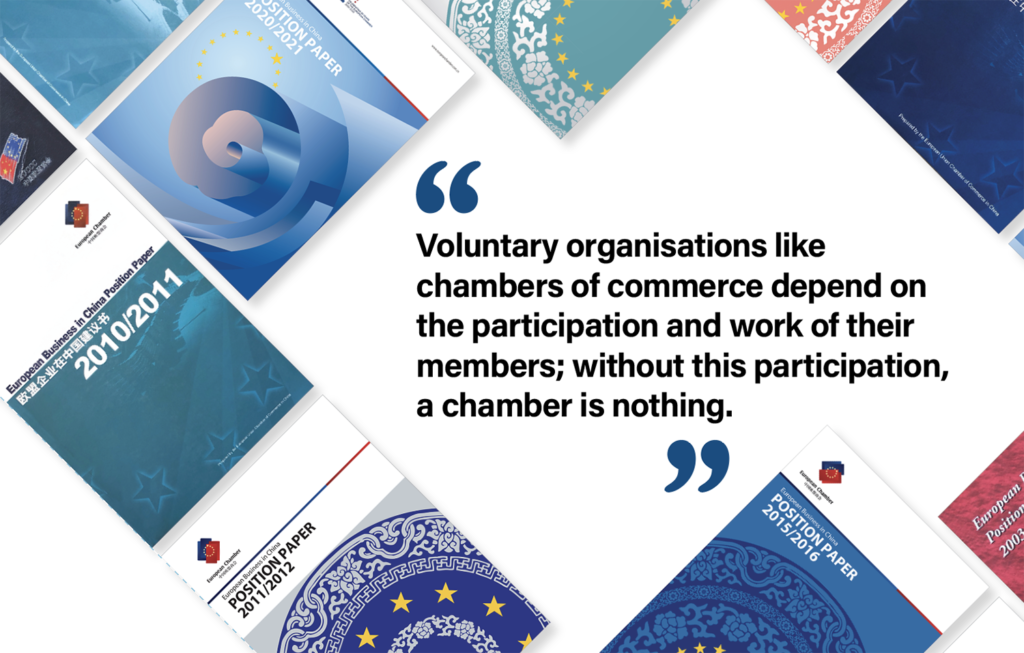
Introduction by Peter Batey, President of the European Chamber (2001)
The 2001/2 European Union Chamber of Commerce in China Position Paper is published at an exciting time. China’s accession to the WTO is imminent and the commitments made the Accession Protocol will bring fresh opportunities for European business in China.
Since its inception in 1999,[1] the European Chamber has been an enthusiastic advocate of China’s membership of the WTO. We congratulate the Chinese Government on the successful completion of its marathon negotiation, which began in 1986. We look forward to greater flows of trade and investment between China and the European Union (EU) as a result.
Our Position Paper is published annually. It is a statement by the Chamber and by the Sectoral Working Groups, which are at its core, of the changes and improvements we would like to see in the business environment to facilitate further growth in trade and investment for mutual advantage. The Position Paper is addressed to both the Government of the People’s Republic of China and the Commission of the European Union.
Some of the changes we were seeking last year have been secured as a result of China’s WTO accession. Some will happen immediately; others will be phased in according to schedules set out in the Protocol of Accession. We did not secure all that we want; negotiations are like that.
Opening of markets is a continuing process, however. It is punctuated by both bilateral agreements and multilateral accords such as the WTO Accession Protocol. The Chamber hopes that the process of opening will continue with the dual objective of securing full reciprocity in terms of market access between Europe and China and widening access to both markets. Even after China’s entry into the WTO, Chinese companies will still have much freer access to European markets than vice versa.
The European Chamber understands that China will need time to digest and implement the changes already agreed. Nevertheless, we feel it is the essence of our role to continue to present to the Chinese Government further changes our member companies are seeking in the market access regime and to brief negotiators in the European Commission on our stance.

We will therefore be presenting the Position Paper to the Chinese Government. We will seek to present it as a whole and to present the contribution of each Sectoral Working Group to its particular regulatory department{s}. We will also present it to the European Commission, both through its Delegation in China and later in 2002 in Brussels.
In order to prepare ourselves better for the next edition (2002/3), we aim to organise a conference early in 2002 in Peking, involving the Sectoral Working Groups, the National Chambers or Business Associations of the European Union countries and the Commercial Sections of the 15 national embassies to discuss the Position Paper.
In 2002, one of the Chamber’s top priorities will be to monitor the implementation of China’s WTO accession pledges and to discuss perceived problems and breaches both directly with the Chinese authorities and with the European Commission. For the work, the Chamber will rely heavily on the Sectoral Working Groups. They in turn will rely critically on their members. Voluntary organisations like chambers of commerce depend on the participation and work of their members; without this participation, a chamber is nothing.
I am confident that the annual Position Paper will become an increasingly useful tool in promoting access to the Chinese market as the years go by. It represents a large commitment of time by the Chamber’s small secretariat led by Philippe Brague and a host of unpaid volunteers who have worked on its preparation. They are too numerous to name here, but they are well-deserving of our thanks. The Chamber is also deeply indebted to Franz Jessen and his colleagues in the Delegation of the European Commission for their assistance.
In preparing detailed documents such as this one, however, it is easy to lose sight of the fundamental purpose. That is to promote trade and investment between Europe and China for mutual advantage: to bring employment, technology, ideas and wealth to both. The Chamber does not believe that trade and investment are a zero-sum game. Nor does it believe that, in pressing for opening of the market, it is seeking to achieve an advantage for Europe at the expense of China. We believe that the healthy development and continuous growth of business between Europe and China is beneficial to both.
In setting forth our
ideas, we are genuinely seeking mutual advantage
[1] The creation of a European Chamber was suggested by then EU Trade Commissioner Pascal Lamy in 1999. The Chamber was officially certified on 19th October 2000.


Recent Comments